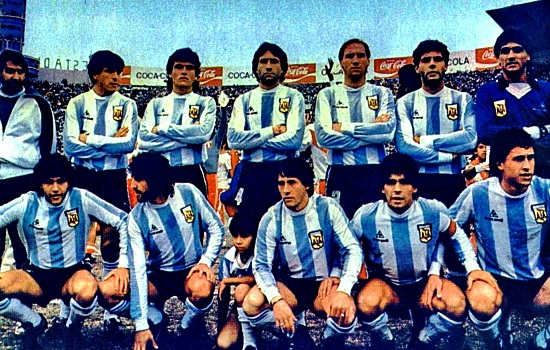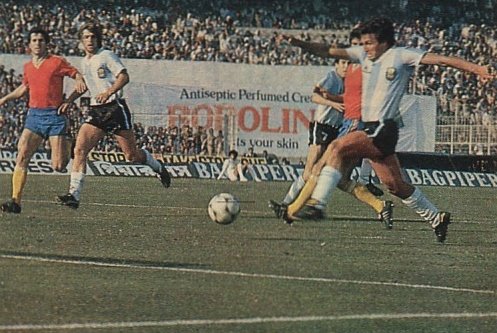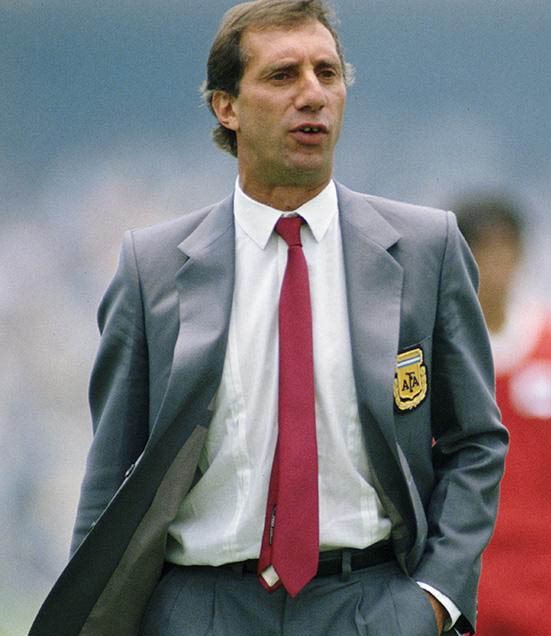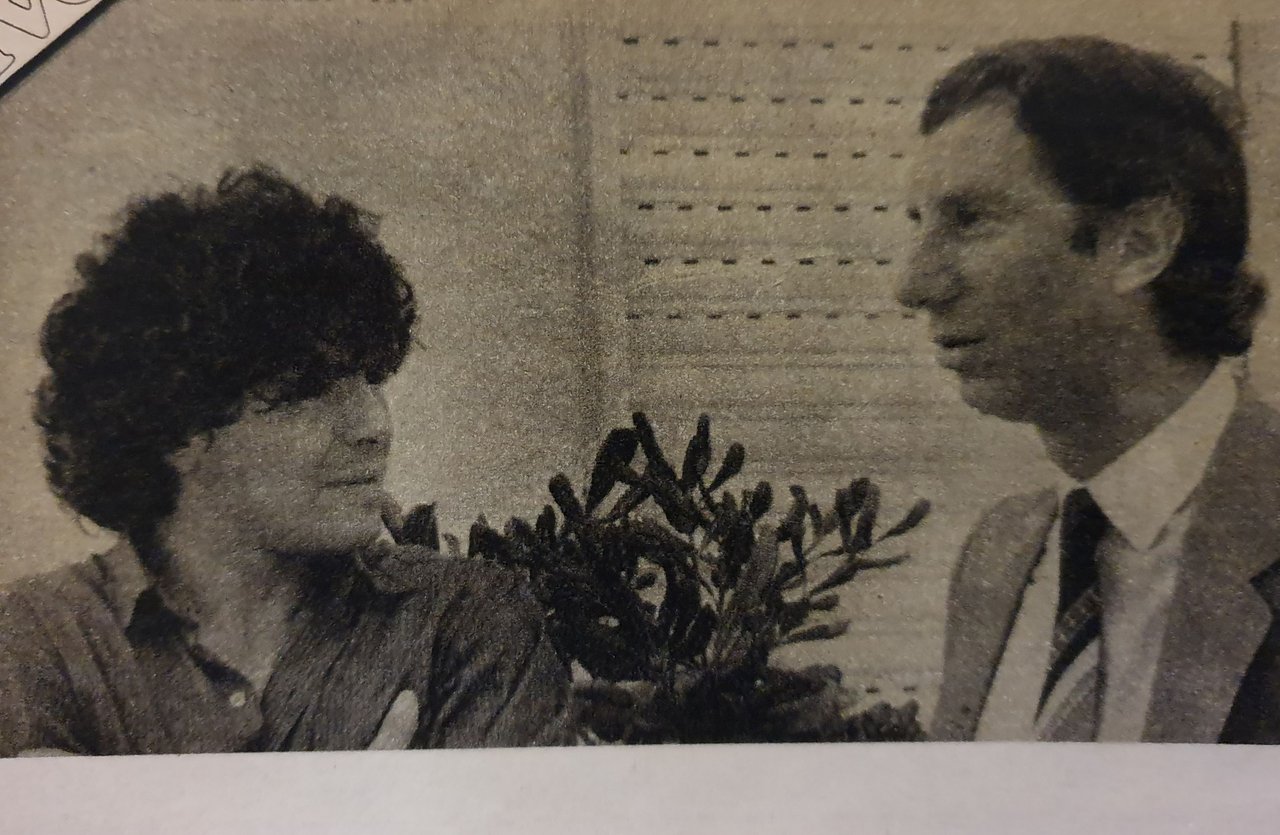Carlos Salvador Bilardo puede ser rotulado de cualquier manera, menos de haber pasado desapercibido por esta vida. Mi exvecino ahora está anciano y retirado del mundo del fútbol y de toda exposición mediática, lo último que se supo de el fueron algunas imágenes donde se lo observaba rodeado de sus seleccionados, aquellos jugadores que junto a él construyeron otra épica futbolística y triunfaron en el mundial de 1986 obteniendo para la Argentina su segundo título mundial.
Bilardo fue jugador de fútbol, de San Lorenzo de Almagro pero principalmente identificado con Estudiantes de la Plata, formó parte de aquel plantel que hizo historia obteniendo la segunda copa intercontinental para nuestro país al ganarle nada menos que al Manchester United una serie de 3 partidos memorables en el año 1968. El DT de aquella hazaña era Osvaldo Zubeldía que formó una escuela de entrenadores, practicantes y defensores de su estilo y cuyo hijo dilecto fue Bilardo.
Aquel equipo de Estudiantes que tocó el cielo con las manos luego se convirtió en el más odiado por diferentes motivos, resaltaba su forma de juego táctico y defensivo, con algunas malas mañas, similar al catenaccio italiano pero tramposo.
Bilardo se retiró como futbolista pero siguió su camino como DT, en Estudiantes de la Plata fue bastante exitoso, coronando su actuación con el subcampeonato en la copa Libertadores de 1978 y el campeonato local en 1982, su llegada a la selección nacional era previsible; siempre con un estilo poco convencional, obsesivo, casi dictatorial, el "narigón" tal su apodo, comenzó su trayectoria como seleccionador principal luego de la salida de su antítesis, Cesar Menotti ante el fracaso de 1982 en el mundial de España.
Para 1984 impulsivamente, como casi todo lo que hacía, decidió embarcar a la selección en una odisea de difícil pronóstico, un viaje hacia la lejana India, para disputar un torneo desconocido y con escasa trascendencia internacional, la copa Nehrú.
Fue la primera vez que una selección argentina salía fuera de América y Europa, viajaba a Asia, a un lugar remoto y desconocido para jugar un torneo ignoto y con participantes de escaso nivel internacional para aquellos tiempos.
Luego de un viaje interminable con escala de un día completo en Nueva York donde el equipo nacional sorprendió a los ciudadanos de esa gran ciudad entrenando en el Central Park y corriendo por sus calles heladas por el frío invierno del norte con la excusa de que no se podía perder ni un minuto de entrenamiento, arribaron a Calcuta, con algunas bajas importantes y luego de un tratamiento y diversas vacunas para prevenir enfermedades de esas regiones.
El primer partido fue contra Rumania y aunque se intentó ocultar, luego se supo que era una selección sub-21 y no fue catalogado por FIFA como un encuentro oficial, se ganó 1 a 0 con muchísimas dudas achacadas al largo viaje y la aclimatación.
El segundo encuentro fue contra Polonia que venía de finalizar tercero en España 1982, fue 1 a 1 en un partido en el que los argentinos merecieron más, se catalogó como el de mejor rendimiento de nuestra selección en todo el torneo.
El tercer compromiso finalizó con una dolorosa e inesperada derrota por 1 a 0 frente a China, un equipo a todas luces inferior pero muy voluntarioso que aprovechó el desgaste de los argentinos para imponer condiciones en el final.
El último partido era a todo o nada y necesitaba golear para tener alguna posibilidad de alcanzar el título, fue victoria ante Hungría (otro combinado formado principalmente por jugadores del Vasas) por 3 a 0 pero no alcanzó porque China le ganó al local por el mismo marcador y se quedó con el título por diferencia de gol.
Llovieron críticas de todos los rincones del país, fue uno de los peores momentos de Bilardo al frente de la selección nacional. Una odisea que terminó mal, aunque siempre el DT dijo que sirvió y mucho, para templar el ánimo de los jugadores, para sufrir y reponerse de las distancias, de una cultura diferente y de un entorno desconocido y hostil.
El año siguiente fue peor si se quiere, sufrimiento indecible aunque con final feliz, como el de los culebrones. Se consiguió la clasificación al mundial en forma agónica, pero esa es otra historia.
Nadie, ni el más optimista bilardista, suponía que Bilardo conseguiría el título para la Argentina en México 1986, quizás esa forma poco pragmática de encarar las cosas, esa obsesión por el trabajo y el estudio de los rivales, su visión del fútbol. Quizás su destino estaba tocado por la varita mágica porque casi vuelve a repetir en Italia 1990.
O quizás, sencillamente, porque estaba Maradona.
Calcutta Odyssey
Carlos Salvador Bilardo can be described in any way, except for having gone unnoticed in this life. My former neighbor is now elderly and retired from the world of football and all media exposure. The last thing anyone heard of him was a few images of him surrounded by his national teams, those players who, alongside him, built another epic footballing legacy and triumphed in the 1986 World Cup, earning Argentina its second World Cup title.
Bilardo was a soccer player, playing for San Lorenzo de Almagro but primarily identified with Estudiantes de la Plata. He was part of that team that made history by winning our country's second Intercontinental Cup by beating none other than Manchester United in a memorable three-match series in 1968. The manager of that feat was Osvaldo Zubeldía, who formed a school of coaches, practitioners, and defenders of his style, and whose beloved son was Bilardo.
That Estudiantes team that reached the sky with its hands later became the most hated for various reasons. Its tactical and defensive style of play, with some tricks, similar to the Italian catenaccio, but tricky, stood out.
Bilardo retired as a footballer but continued his career as a manager. He was quite successful at Estudiantes de la Plata, crowning his performance with a runner-up finish in the 1978 Libertadores Cup and the local championship in 1982. His arrival at the national team was predictable. Always with an unconventional, obsessive, almost dictatorial style, "El NNiño (Big Nose), as he was nicknamed, began his career as head coach after the departure of his opposite, César Menotti, following the 1982 World Cup failure in Spain.
In 1984, impulsively, like almost everything he did, he decided to embark the national team on an odyssey with difficult predictions: a trip to distant India to compete in an unknown tournament with little international significance, the Nehru Cup.
It was the first time an Argentine national team had traveled outside the Americas and Europe, traveling to Asia, to a remote and unknown place to play in an unknown tournament with participants of little international standing at the time.
After an interminable journey with a full-day stopover in New York, where the national team surprised the citizens of that great city by training in Central Park and running through its icy streets in the cold northern winter, with the excuse that they couldn't miss a minute of training, they arrived in Calcutta with some important absences and after undergoing treatment and various vaccinations to prevent diseases from those regions.
The first match was against Romania, and although attempts were made to hide it, it was later revealed that it was a U-21 team and wasn't classified by FIFA as an official match. The game was won 1-0, with many doubts due to the long trip and acclimatization.
The second match was against Poland, who had just finished third in Spain 1982. It ended 1-1 in a match in which the Argentines deserved more. It was considered our team's best performance in the entire tournament.
The third match ended with a painful and unexpected 1-0 loss to China, a clearly inferior but very determined team that took advantage of the Argentines' fatigue to impose its influence in the final minutes.
The final match was all or nothing, and they needed a win to have any chance of winning the title. They won 3-0 against Hungary (another team made up primarily of Vasas players), but it wasn't enough because China beat the host team by the same score and took the title on goal difference.
Criticism rained down from all corners of the country; it was one of Bilardo's worst moments in charge of the national team. An odyssey that ended badly, although the coach always said it served a great deal to temper the players' spirits, to help them suffer and recover from the distance, a different culture, and an unfamiliar and hostile environment.
The following year was worse, if you will, unspeakable suffering, albeit with a happy ending, like those in a soap opera. Qualification for the World Cup was achieved agonizingly, but that's another story.
No one, not even the most optimistic Bilardo fan, imagined that Bilardo would win the title for Argentina in Mexico 1986. Perhaps it was because of his unpragmatic approach, his obsession with hard work and studying his opponents, his vision of football. Perhaps his destiny was touched by a magic wand, because he almost repeated in Italy in 1990.
Or perhaps, simply, because Maradona was there.
Héctor Gugliermo
@hosgug



